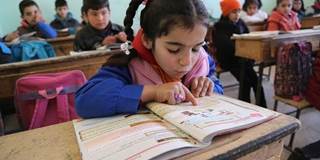The Global Citizen Commission has been working to articulate the ethical basis of global citizenship, by revisiting and renewing existing charters and declarations that can underpin a new, ethically responsible world order. Among those documents is the UN's Universal Declaration of Human Rights.
NEW YORK – What responsibility do we have for the world we inhabit? What do we owe one another, and what can we claim from others who share the planet with us? As the world becomes increasingly interconnected, the importance of such global-minded ethical considerations is becoming ever clearer. Indeed, it is imperative for us to begin thinking as global citizens, citizens of the world, even if our first allegiance is to a particular country.
That shift in mindset is exactly what the so-called Global Citizen Commission is attempting to achieve. Led by former British Prime Minister Gordon Brown, the GCC includes Graça Machel, Anthony Appiah, Amartya Sen, Wang Chenguang, Kate O’Regan, Robert Rubin, Asma Jahangir, Jonathan Sacks, Mohamed ElBaradei, and me. Together, we have been working to articulate and publicize the ethical basis of global citizenship, not by issuing some new manifesto, but by revisiting and renewing existing charters and declarations that can underpin a new, ethically responsible world order. Among those documents is the United Nations Universal Declaration of Human Rights.
Affirmed and published in 1948, the UDHR was intended to serve “as a common standard of achievement for all peoples and all nations.” Following the barbarism and savagery of the 1930s and 1940s, the UDHR reaffirmed “the dignity and worth of the human person” and “the equal rights of men and women.”

NEW YORK – What responsibility do we have for the world we inhabit? What do we owe one another, and what can we claim from others who share the planet with us? As the world becomes increasingly interconnected, the importance of such global-minded ethical considerations is becoming ever clearer. Indeed, it is imperative for us to begin thinking as global citizens, citizens of the world, even if our first allegiance is to a particular country.
That shift in mindset is exactly what the so-called Global Citizen Commission is attempting to achieve. Led by former British Prime Minister Gordon Brown, the GCC includes Graça Machel, Anthony Appiah, Amartya Sen, Wang Chenguang, Kate O’Regan, Robert Rubin, Asma Jahangir, Jonathan Sacks, Mohamed ElBaradei, and me. Together, we have been working to articulate and publicize the ethical basis of global citizenship, not by issuing some new manifesto, but by revisiting and renewing existing charters and declarations that can underpin a new, ethically responsible world order. Among those documents is the United Nations Universal Declaration of Human Rights.
Affirmed and published in 1948, the UDHR was intended to serve “as a common standard of achievement for all peoples and all nations.” Following the barbarism and savagery of the 1930s and 1940s, the UDHR reaffirmed “the dignity and worth of the human person” and “the equal rights of men and women.”